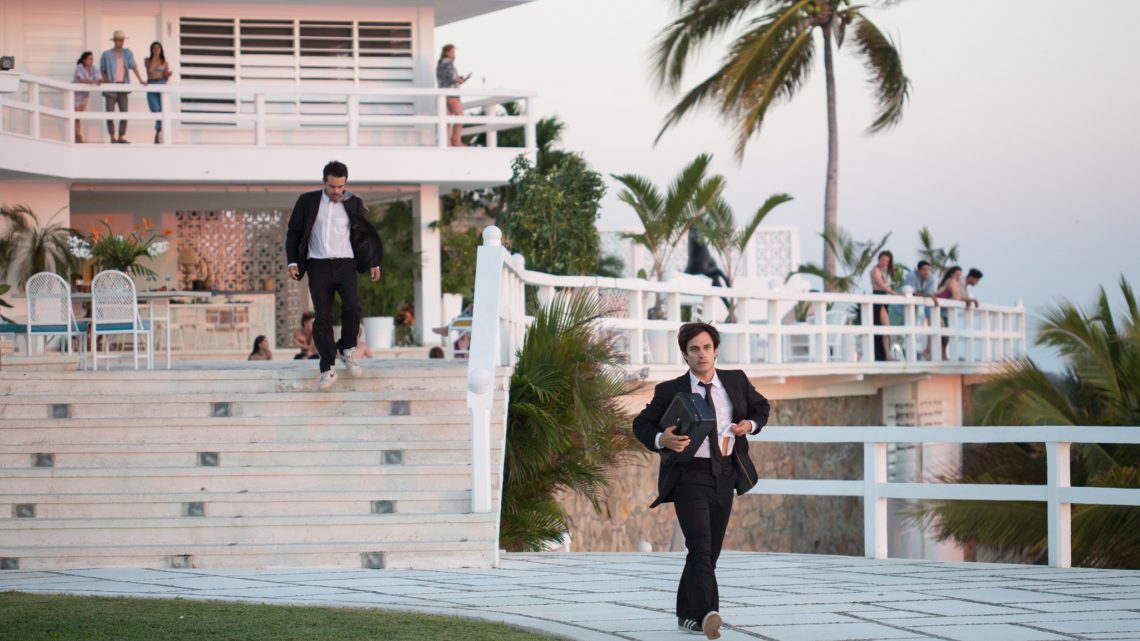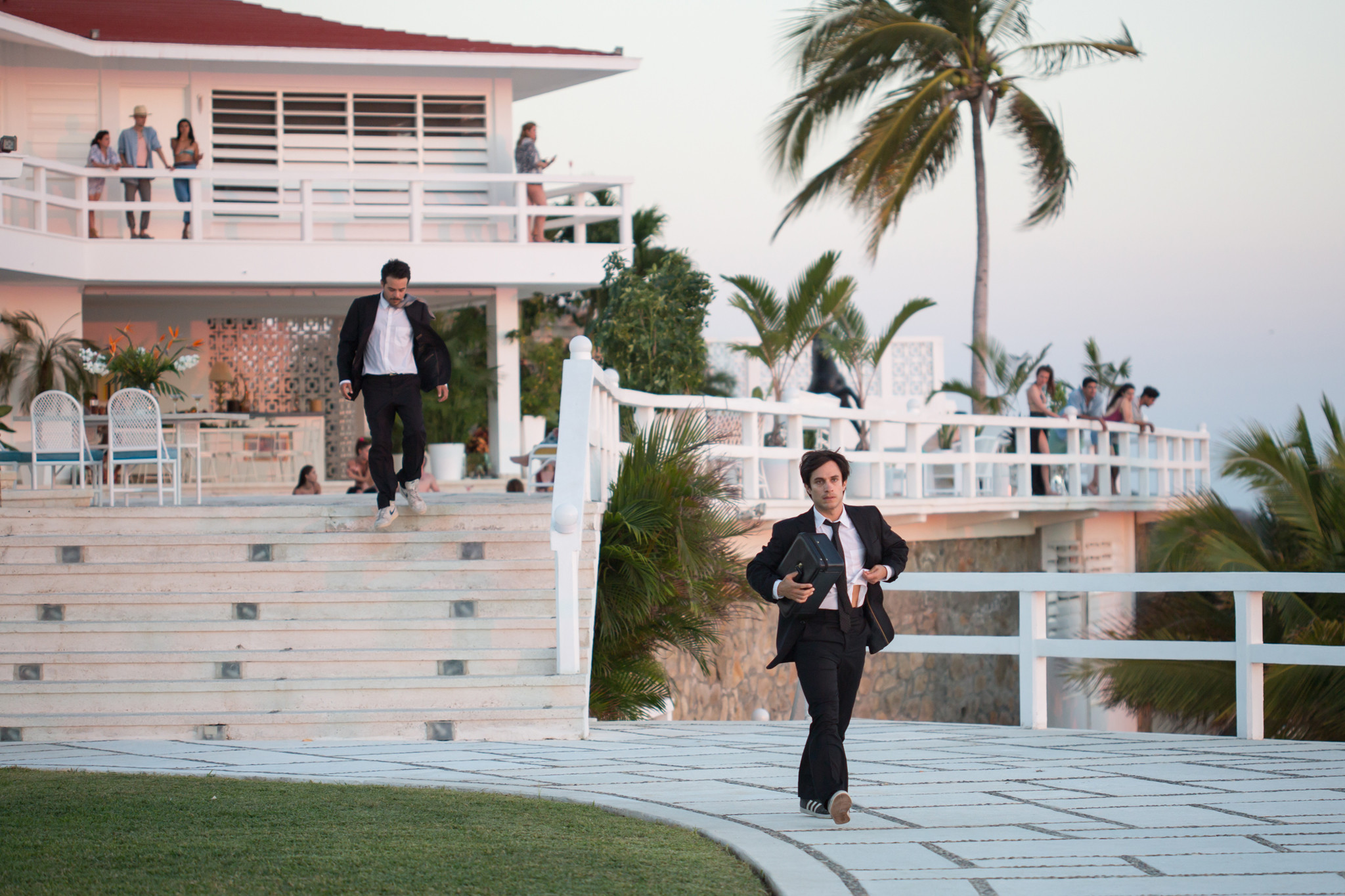
Gael García Bernal on Male Friendship and the Crisis of Masculinity
September 21, 2018“This story is a replica of the original,” launches Alonso Ruizpalacios’s Museo, released last weekend. On its surface the caper film—based on the true story of the 1985 robbery of the Museum of Anthropology in Mexico City—follows a traditional bust-in-and-skedaddle trajectory. Introspective friends Juan (Gael Garcìa Bernal) and Wilson (Leonardo Ortizgris) flee the tedium of suburban life and wind up on the run with two duffle bags stuffed with priceless pre-Colombian loot. But at its core, Ruizpalacios’s first major feature offers a rare reflection on the intimacy and struggles inherent to close male friendships, exploring how easily the bonds that can tie men together become the means for reckless power plays that tear them (along with the rest of the world) spectacularly apart.
As the mastermind behind the doomed art heist, Bernal plays a form of pensive schemer that has characterized much of his filmography, from Y Tu Mama Tambien to Motorcycle Diaries to Desierto. With a boyish, mercurial face evincing the subtlest shift in affect, the actor has resisted staid masculine archetypes in wildly different ways (of his drag performance in Almodovar’s Bad Education, he has boasted, “It didn't take that long in the makeup room to look like a woman”).
In Museo, the actor presents Juan as both privileged and tormented, as hopelessly adolescent with his family as he is brazenly loyal to Wilson, his puppy-eyed bestie who does practically anything to please him. The film’s best scenes explore the dangers of the friendship while honoring the complexity of the love that endures between them.
VICE caught up with Bernal on the phone the day Museo opened in New York. The following conversation has been edited and condensed for clarity.

VICE: Museo handles male friendship and vulnerability with such sensitivity—sadly strange to see in US films. When we make buddy movies, they tend to resemble different versions of The Hangover. We have to import the pathos from Mexico…
Gael García Bernal: It is something that definitely needs to be addressed. It is no secret that we’re living in a moment of crisis for masculinity. Really the final product of masculinity—its final definition—is a really shallow and incredibly diluted form of the complexity of human emotions. Not a lot of thought went into building that masculine identity—it lacked a conversation and discussion.
More recently, this conversation has been going on, and in a much more open way. The feminist discussion in the [21st century] is definitely something that needs to happen, and applies also to men. As a man growing up, you hit brick walls all the time in terms of understanding what things are supposed to be. We owe to feminism the huge amount of freedoms and vulnerability and expression that men can have right now, but at the same time there is very little discourse on the type of sensuality experienced being a man in a friendship with another man.
In Museo there’s a fantastic scene where Wilson lifts Juan in the air and spins him around in a celebratory way. We usually don’t see two male friends embracing onscreen like that unless we’re watching the World Cup.
[Laughs] Exactly. That is an interesting take.
In a way, it seems like Juan and Wilson pull off the heist simply to prove their trust in and love for each other.
Yes, and also to test that trust and bond that they have—and to put them into play. This interpretation of the heist is maybe the least talked about, but it might be the one we need to talk about the most. The friendship between these two guys is definitely essential to the story and the film, and actually, might give important clues to understand what happened in real life as well. We know for a fact that Wilson—the character played by Leonardo Ortizgris—left Mexico and disappeared and never got caught. My character, Juan, went to prison, but because they found all the pieces he stole, he only served two years. Only a few years later, they found him dead in Cancún. There’s a lot we don’t know, but we do know that there was a kind of sacrifice that one friend did for the other.
The end of the film is both tragic and heroic. For much of the story, Juan is a bully to Wilson, but at the end he redeems himself by taking the fall.
Exactly. Juan redeems himself with the story, with the film. It’s always nice to see characters redeeming themselves—not in a moral way or even an ethical way, but more within the narrative—the redemption could be the end of the story, the end of the fable, the end of the honeymoon, going into a next stage of sorts.
I love the interaction between Juan and Wilson—working with Leonardo was fantastic. I had never worked with him, but we became really close. The director already knew that this would happen before he casted us. He knew that it was going to work. We loved going around Mexico, having fun, and actually enjoying the strange calm that the ‘80s provided us in not having a cell phone to distract. We went to Palenque, Acapulco, the Museum of Anthropology in Mexico City. We shared some of the most incredible and fascinating things about being an actor. Shooting at 3AM at the Aztec Hall in the Museum is one of the most wonderful privileges that one can have in life. And that can only be done if you’re in actor!
Or if you’re breaking into a museum in 1985…
Exactly [laughs].
In so many of your movies— Y Tu Mama Tambien and Motorcycle Diaries, for instance—there’s a theme of going on a journey with a close male friend.
Yeah, it’s been wonderful. This opportunity in film has provided me also with really good friends that I’ve made for life. Me and Diego [Luna] knew each other before, so it was like we had been rehearsing all our lives. But with Rodrigo de la Serna in Motorcycle Diaries and Leonardo Ortizgris, we became really, really close while shooting. That vulnerability depicted between men is so necessary. There’s so much damage that was caused by the intensity of post-Stella Adler actors in film, especially in the United States. Of course, with some actors that method worked really well, but for others it became a kind of façade, a way for men to hide. Their male torment became a justification for not being able to express or explore themselves. It became its own type of alienation. It is important to go into a much more candid and secure way of showing the bond of friendship between men—the trust it can build, the joy it can give, and the huge potency to do things that are unthinkable. Like robbing a museum, in the worst case! [Laughs]
There’s a stark power differential between Juan and Wilson. Which one do you identify with more?
I think I’ve always been on the Juan side of things. I’m the oldest of my brothers and sisters, and with my friends my dynamic was always more like Juan, moving things along and trying out things. Obviously, Juan is the extreme. But I love these types of characters who are living on the edge. There has to be something strange going on for him to do what he does. He has that hubris and strong anxiety—always having a stomachache, for example. But that’s also why Juan and Wilson are good friends for each other. Juan is the only friend that Wilson can have, and Wilson is the only friend that Juan can have.
They need each other, and become like brothers.
In the end of the film, what moves me a lot is their sacrifice for each other. The heartbreak is that they’re going to be separated. We’re seeing the movie through Wilson’s eyes—and that is beautiful, I think. It’s almost never that character who gets to tell the story.
He says, “Sometimes I wonder what would have happened if Juan hadn’t separated from me.” He’s lost the most important relationship of his life.
The real life character of Wilson is somewhere around in the world, and I think he’ll eventually watch this movie. I don’t know what he’s going to think, but I think it’s fascinating how an event like this completely changed their lives and changed their families’ lives. They became also part of the history of the ancient pieces that they stole. When we see the jade mask today in Mexico, we wonder how much time it spent in a backpack!
You’ve been called an “intellectual woman’s heartthrob,” but in most movies you’re not playing a romantic lead, but rather a friend or brother. At the same time you tend to challenge the conventional sense of machismo. Do you think about that when choosing roles?
There have already been so many romantic films telling man-and-woman stories, and those films are overtaken by romantic comedies. I would actually love to do a romantic film, but I think there is something to the times we are living in and the choices I make, that I tend not to. I don’t know, actually. You have me dumbfounded. I need to keep thinking about this. [laughs]
Sign up for our newsletter to get the best of VICE delivered to your inbox daily.
Follow Eileen G'Sell on Twitter.


